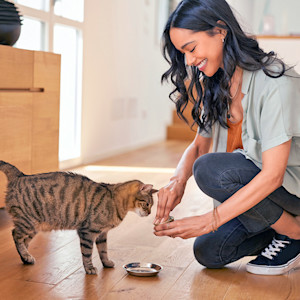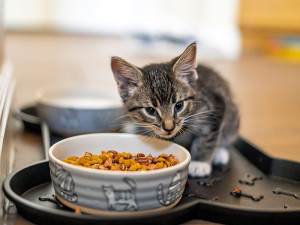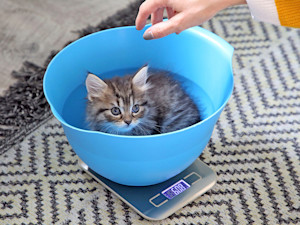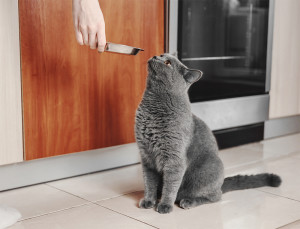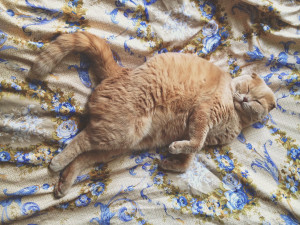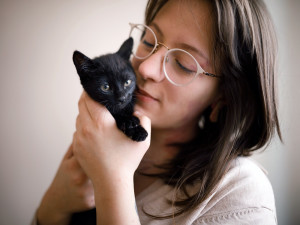Can a Kitten Eat Adult Cat Food?
Uhh, is that safe, little guy?

Share Article
In This Article:
Understanding Nutritional Requirements for Kittensopens in a new tab Can You Feed Your Kitten Adult Cat Food?opens in a new tab How to Feed Cats of Different Agesopens in a new tab When to Switch a Kitten to Adult Cat Foodopens in a new tab Frequently Asked Questionsopens in a new tab
If you’re a cat parent, you’ve probably, at one time or another, been tempted to get more than one cat. Once the inevitable happens, and you have a small zoo of cats, feeding time might get dicy. What if your curious new kitten really wants in on your grumpy adult cat’s food (if they’ll share). Can kittens eat adult cat food?
In short, the answer is no. Kittens cannot eat adult cat food. Growing kittens and adult cats have different nutrition needs. Don’t worry, it’s not too complicated. We talked to two veterinarians to get advice on the best food to feed kitten and how to deal with feeding multiple cats who need different foods.

Get (totally free) deals for food, treats, accessories, tech, and way more pet parenting must-haves.
opens in a new tabUnderstanding nutritional requirements for kittens
Kittens develop at an impressive rate. To fuel that extraordinary growth, they need more calories than fully grown adult cats. Kittens also need certain nutrients in different ratios than older cats.
“Just like in people, nutritional requirements change throughout the course of a cat’s life,” says Dr. Chris Konvalinka, a veterinarian at Bahama Road Veterinary Hospital in Bahama, North Carolina. “Kitten food is designed to provide more protein, calories, fat, vitamins, and minerals to meet the needs of rapidly growing bodies. In adulthood, those requirements change, and therefore the foods should change as well.”
Protein, fat and caloric intake
Kitten food, sometimes called “growth formula” on the package label, provides higher levels of protein, fat, and calories compared to adult cat food (sometimes called “maintenance formula” in the label).
The American Association of Feed Control Officials (AAFCO), which maintains standards for pet food, recommends that kitten food contain at least 30 percent crude protein and 12 to 24 percent fat. This percentage refers to the food’s “dry matter” content, which accounts for the amount of water in the food. In comparison, adult cat food has at least 26 percent protein and at least 9 percent fat.
Thanks to its higher fat content, kitten food is more energy dense — contains more calories per ounce.
Omega-3 requirements
Omega-3 fatty acidsopens in a new tab — in particular, EPA and DHA — are critical nutrients for kitten development. AAFCO recommends that kitten foods have 0.012 percent combined EPA and DHA. In comparison, adult cat food has no AAFCO minimum recommendation for EPA/DHA. Not all adult cat foods contain omega-3 fatty acids, though adult cats might still benefit from these nutrients. DHA is especially important for kittens as it helps support healthy brain and eye development. Omega-3 fatty acids are also helpful for skin, coat, and the immune system.
What's the difference between kitten food vs adult cat food?
The three major differences between kitten food and adult cat food include:
Nutrient composition and caloric density: Kitten food has more protein and fat, and is more calorie dense than adult cat food. It also contains different levels of vitamins and minerals compared to adult cat food.
Texture and size of kibble: Dry kitten food tends to have smaller sized kibbles for small mouths.
Supplements and additives: Kitten food always contains omega-3 fatty acids, which are not always found in adult cat food.
Can you feed your kitten adult cat food?
No, you shouldn’t feed your kitten adult cat food. According to Preston Turano, a veterinary spokesperson at Felix Cat Insurance, adult cat food does not have the nutrition profile needed for growth and development.
“If adult food only is fed to a kitten, it can slow or even harm their development,” he says. “If you have multiple cats and your kitten accidentally gets into the adult food it will not hurt them, but their main diet needs to be formulated for a kitten.”
How to feed cats of different ages
If you have an adult cat and a kitten, it is possible to feed them the same food. You would just have to choose a food labeled for “all life stages,” which means it meets the nutritional needs of both kittens and adult cats.
However, Dr. Turano recommends talking with your veterinarian about whether that’s the best option, rather than just an adequate option, for your cats. “It is generally better to do separate feedings with the most appropriate diet so your growing kitten can get the best nutrition for development,” he says.
Diets formulated for all life stages tend to be higher in fat and calories than adult cat food, so they might not be a good option if your adult cat is overweight. Additionally, Dr. Konvalinka points out that some senior cats, especially those with medical conditions, might have special nutritional needs that wouldn’t be met by an “all life stages” diet.
When to switch a kitten to adult cat food
Dr. Turano confirms that the best age to switch a kitten to adult food is somewhere between eight months to one year of age, once they’ve completed the majority of their growth. If you’re not sure about the timing of the switch, have a chat with your veterinarian, who can make personalized recommendations for your cat.
Anytime you change your cat’s food, do so gradually, over a period of days or even weeks. This will help to avoid stomach upset. Slowly mix increasing amounts of the new food into the old until the cat has transitioned completely to the new food.
FAQs (People also ask):
When can kittens eat dry food?
Kittens can eat dry food around five to six weeks of age. Initially, soften the dry food with kitten milk replacer or water to make it easier for young kittens to chew. They still need to nurse or drink kitten milk replacer at this age.
When can kittens eat wet food?
Kittens can eat wet food when they begin the weaning process, around three to four weeks of age. They still need to nurse or drink kitten milk replacer at this age.
Is wet or dry kitten food better?
Both wet and dry kitten food provide proper nutrition for kittens as long as the food is formulated according to the American Association of Feed Control Officials (AAFCO) for growth and reproduction. Wet kitten food offers more moisture, which is helpful for keeping kittens hydrated.
Can you feed a 10-month-old kitten adult cat food?
A kitten can usually transition to adult cat food once it has finished most of its growing. If you’re not sure when to switch your kitten over, check with your veterinarian.
Can adult cat food give kittens diarrhea?
Adult cat food generally won’t give kittens diarrhea, but this could happen if kittens eat some adult cat food that they aren’t used to having.
Can older cats eat kitten food?
Adult cats should not eat kitten food as it doesn’t have the best mix of nutrients and calories for grown cats. Adult cat food (called maintenance) is formulated to meet the needs of adult cats. Adult cats can also eat food formulated to meet “all life stages” (you can also feed this to kittens). If you have a senior cat, talk to your vet about the best food to meet their needs.
What are some signs a kitten isn't getting proper nutrition?
Kittens that are not getting proper nutrition might show signs of slowed or halted growth, weight loss, poor coat or hair loss, dull eyes, low energy, bowed legs, pale gums, diarrhea, or vomiting.
Can you mix adult cat food with kitten food?
You can mix adult cat food with kitten food when you are transitioning your kitten to an adult diet around one year of age. Otherwise, kittens should eat kitten food and adult cats should eat adult cat food.
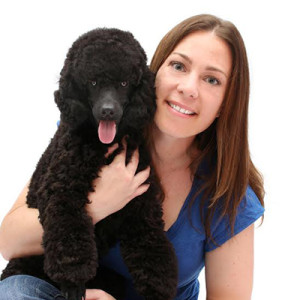
Jackie Brown
Jackie Brown lives in sunny Orange County, CA, where she works as a freelance writer and editor. When she’s not on deadline, you can find her paddling her outrigger canoe in the Pacific Ocean or hiking in the foothills with her miniature poodle and two young boys.
Related articles
![Kitten on a scale]() opens in a new tab
opens in a new tabHow to Help a Kitten Gain Weight
Of course, always talk to your vet first.
- opens in a new tab
Can You Give a Kitten Milk?
It depends on what kind.
![a fluffy cat eating food from a bowl]() opens in a new tab
opens in a new tabDo Cats Need High-Calorie Cat Food?
Why you should only be packing on the calories in certain situations.
![Hand holding food bowl peeks into frame as a cat looks up expectantly]() opens in a new tab
opens in a new tabThe Ultimate Puzzle: Picking the Right Cat Food
Four veterinary nutritionists pick apart the claims so that you can choose the right food for your kitty.
![overweight orange cat]() opens in a new tab
opens in a new tabHow Much Should You Actually Be Feeding Your Cat?
If they’ve lost their hourglass figure, then not that much — according to a veterinary nutritionist.
![Relaxed girl holding a black kitten near her face.]() opens in a new tab
opens in a new tabWhat to Expect When Fostering a Kitten
Besides plenty of cuteness, of course.

